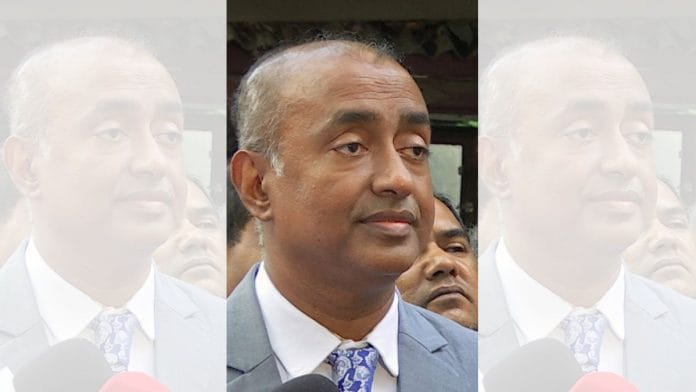New Delhi: Mohammad Asaduzzaman, the Attorney General of Bangladesh, has called for sweeping changes to the country’s constitution, including removal of terms such as secularism, socialism and Bengali nationalism from the document, local media reports.
Asaduzzaman, who was appointed as the country’s top judicial officer months after the fall of the Sheikh Hasina-led Awami League government, also termed ‘illegal’ the constitutional provision declaring Sheikh Mujibur Rahman as “father of the nation”.
He made the remarks even as a high court hearing is underway to decide the legality of the 15th amendment to the country’s constitution. The hearing took place Wednesday before a bench comprising justices Farah Mahbub and Debasish Roy Chowdhury of the High Court Division of the Supreme Court of Bangladesh.
The Constitution of Bangladesh has been amended 17 times since the country’s formation in 1971 and the 15th amendment, introduced on 30 June 2011, brought in some significant changes to the constitution.
In this amendment, introduced during Hasina’s second term as prime minister, concepts of nationalism, socialism, democracy and secularism were adopted as fundamental principles of state policy along with the acknowledgment and declaration of Rahman—the first president of independent Bangladesh—as the father of the nation.
These remarks by the country’s top judicial officer come in the backdrop of the removal of Rahman’s portraits from important government places by members of the interim government led by Nobel laureate Muhammad Yunus.
Article 4A of the Bangladeshi constitution mandates display of Rahman’s portraits at all government buildings and offices.
Asaduzzaman called Rahman the “undisputed leader” of Bangladesh but said there were actions in the past to politicise his name.
Also Read: Bangladesh staged a revolution for freedom. Now they’re clamping down on journalists
‘Do not reflect realities’
Addressing the changes made in Article 8 of the constitution through the 15th amendment more than a decade ago, Asaduzzaman argued that adopting socialism and secularism as fundamental principles of state policy do not reflect the realities of a nation whose population has 90 percent Muslims.
He advocated for going back to the fifth amendment on this subject which, when introduced in 1979, removed secularism and added “In the name of Allah, the Beneficent, the Merciful”.
Asaduzzaman further argued against the concept of Bengali nationalism as a fundamental principle of state policy, calling it “inconsistent” with modern democratic principles.
Bengali nationalism, invoked in Article 9 of the constitution states, “The unity and solidarity of the Bangalee nation, which, deriving its identity from its language and culture, attained sovereign and independent Bangladesh through a united and determined struggle in the war of independence, shall be the basis of Bangalee nationalism.”
Asaduzzaman further sought bringing back the provision of referendum in the constitution which was earlier included in Article 142 but was withdrawn in the 15th amendment.
“This provision was removed by the 15th Amendment, but we want it reinstated,” Dhaka Tribune quoted Asaduzzaman as saying. “The provision was abolished through the votes of those who became MPs by stealing votes at night.”
(Edited by Radifah Kabir)
Also Read: Anti-India Dhaka welcomed me with open arms—and some suspicion that I was an R&AW agent






